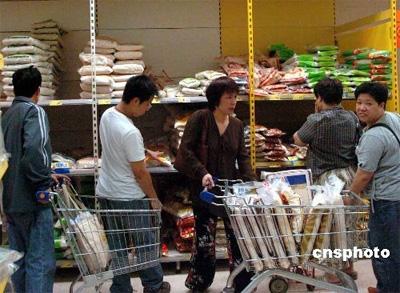
HONG KONG / SHANGHAI - Growing inflationary pressure on the Chinese mainland, led by rising food prices, is driving mainland buyers to Hong Kong to fill their shopping carts - not for the luxury and imported goods the financial hub is known for, but for daily necessities that used to flow the other way.
More and more residents in South China's Guangdong province, especially Shenzhen, have in the past few weeks been queuing to cross the border into Hong Kong to buy sugar, salt, soybean sauce and even tissue paper in bulk to cushion increasing pressure from rising food prices at home.
Figures from the Shatoujiao border station in Shenzhen show that in the past two weeks, the number of people passing the station to visit Hong Kong on weekdays has increased by 16.7 percent compared with two weeks ago, while at weekends the figure has been up by 27.8 percent. Many of them are going to the other side to buy daily necessities, according to local media reports.
Only a few years ago it was Hong Kong residents who would come to Shenzhen to spend weekends shopping and dining.
A Shenzhen local woman surnamed Zhang said shopping for supplies in Hong Kong has been the norm for her since 2009, when she was allowed to apply for multiple entries to Hong Kong within one year.
Since then, the number of items on her shopping list has been growing from imported goods to most daily necessities, including products made on the mainland.
"I've even started buying salt in Hong Kong," she said. "Many living essentials are cheaper in Hong Kong, some of them even by 50 percent, and I suppose these goods are of better quality compared with those sold in Shenzhen," she added.
Zhang's favorite shopping destinations in Hong Kong are the supermarkets spotted around Sheung Shui Station - the first subway station where trains departing from Shenzhen stop.
A one-way ticket costs HK$19.5, or 17 yuan ($2.55), which, according to Zhang, is even cheaper than taking a taxi when going shopping at home.
A sales assistant surnamed Wong from the Park'n Shop - one of the most popular supermarkets in Hong Kong - told China Daily that she is no longer a fan of Shenzhen as the Hong Kong dollar is getting weaker while prices are rising in Shenzhen.
"I used to spend a lot of time in Shenzhen but in the past four or five months, I only traveled there once," said Wong, adding that everything is becoming costly in Shenzhen, even drinking morning tea.
The weaker Hong Kong dollar, said Wong, is another reason she tries to curtail her visits to Shenzhen.
"HK$100 used to trade 116 yuan but now it is totally reversed. Mainland visitors swarm into our shops, especially during weekends, since buying goods here has become a really good bargain," Wong added.
Mainland customers' favorites, according to Wong, are those imported goods as well as Hong Kong-made items, including milk powders, snacks and toiletries.
"Some of them buy a case of Hong Kong-made instant noodles, and I heard it is sold for less than half the price in Shenzhen," said Wong.
In Shanghai, a recent survey jointly launched by Oriental Morning Post and Fudan University's School of Management showed prices of personal care products, such as shampoo and shower cream, are on average three times higher in Shanghai than in Hong Kong.
A China Daily random investigation found that a 750-milliliter bottle of Rejoice, a shampoo brand, costs 46.5 yuan at the Lianhua Supermarket in Shanghai, while its 1000-ml version costs only HK$48.8, or 42 yuan, in Hong Kong.
Likewise, a 500-ml bottle of Listerine mouthwash costs 28 yuan in Shanghai while its 1000-ml version costs only HK$53.9, or 46.4 yuan.





